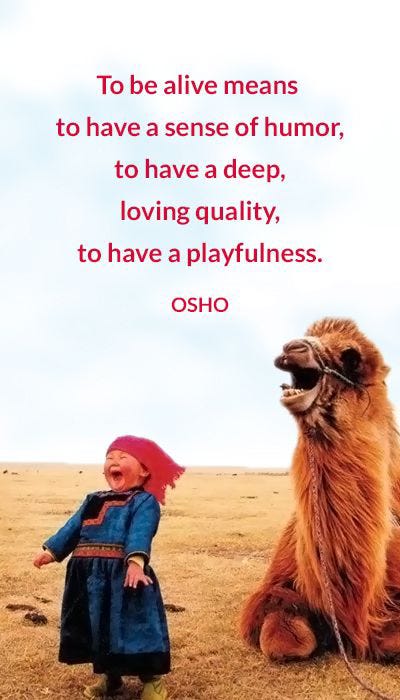Playful Pants: The Power of Playfulness and Humor in Relationships
Something about humor and play warms people’s hearts toward one another.
Hello and welcome, treasured one—
I don’t know if this sounds weird, or normal, but: I have a lot of “ah-ha” moments in the shower. There’s something about the feel of the perfectly warmed water, combined with the ritual of washing my body. They take me out of my daily tasks, stressors, and to-dos, which frees and opens my mind to greater insights and clarity. Do you have any places and/or practices like that?
While I was washing off the other day, it dawned on me how helpful and wise something my partner regularly does is. She has this way of using playfulness and humor to simultaneously call me out, and disarm me. For instance, every morning I make Lisa’s coffee—with creamer and sweetener—and bring it to her. When I see her mug is getting empty, I’ll ask: “How’s your coffee situation? Would you like some more?”
A few times—after she responded affirmatively—I’ve answered, “Great, the coffee pot is in the kitchen, you know where to find it.” In response my wife has paused, looked down at my legs, nodded, and said: “Yup, just as I thought. I see you have your bratty pants on.”
Naturally, in these instances, we were just being playful with one another—and each time, I went and got her coffee. But there have also been times when Lisa’s reference to my “bratty”, “snarky”, or “worried pants” was warranted. So, let’s explore why this is so wise and wonderful.
First off, this approach is playful. It’s simultaneously serious, and light-hearted. It names a real issue, without pointing fingers—so to speak. This is crucial, because when someone feels you’re verbally pointing your finger at them, their defenses go up. They put on their proverbial armor, and draw their sword.
Pause for a moment and feel the difference between someone telling you, “you’re a brat” or “you’re being bratty”, versus, “looks like you have your bratty pants on today.”
Playfully drawing someone’s attention to their missteps or wrongs, not only lowers their defenses, it makes them in on the joke. It allows them to become coconspirators with you in being and behaving better.
Do you see what I mean? While telling someone “you’re a brat” will start a fight, letting them know they’re “wearing bratty pants” will begin a game.
A second, related, benefit to phrasing thigs like this is: It separates the person from the problem. As you, hopefully, know. You are not your pants. Those are clothes you can put on, take off, give to Goodwill, or even throw out. That’s why when Lisa looks from my eyes to my legs, before saying: “Ahh, looks like you’re wearing judgy jeans today”, she’s also letting me know:
You can change your attitude, as easily as you can change your clothes.
Granted, sometimes there’s a bit of a process to this. You might need to get up, breathe, move a bit, and so on to shift your mindset. But the way referring to someone’s current attitude as the “pants” their wearing separates them from issue, really speeds the process.
As I wrote the last paragraph something occurred to me: This playful practice isn’t just something we can use when we talk to other people, we can use it on ourselves! In other words, when you find yourself frustrated, stressed, judgmental, and so on; you can pause, playfully tell yourself, “looks like you have your _____ pants on”, and choose to change your attitude.
While it would be pretty dope if we started a “Pants” Revolution, which landed Lisa on Oprah; naturally the bigger take away here is to engage yourself and others with a spirit of playfulness and humor. After all:
How does this land with you? Does it spark or inspire something within you? Please let us know in the comments, click the “like” button 🤍 if this spoke to you, and share it with anyone you think it could benefit. And above all, please remember: YOU are amazing, and I hope you have a beautiful day!
Hugs & Love,
Lang (aka “Dr. Love”)





